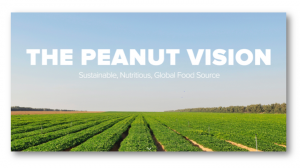 USA-grown peanuts are perfectly positioned as the food of now and the food of the future. To help the peanut industry tell this story, the National Peanut Board has launched a new online resource: The Peanut Vision at peanutvision.org. This platform gives a 360-degree view of peanuts’ benefits in five key areas: Wellness, Environment, Food Safety, and Community.
USA-grown peanuts are perfectly positioned as the food of now and the food of the future. To help the peanut industry tell this story, the National Peanut Board has launched a new online resource: The Peanut Vision at peanutvision.org. This platform gives a 360-degree view of peanuts’ benefits in five key areas: Wellness, Environment, Food Safety, and Community.
“These areas of focus align with expectations we’re hearing from retailers, millennial consumers, health and nutrition communities, and international groups,” said NPB President & CEO Bob Parker.
“Retailers want proof of a commitment to sustainability. Millennials, the generation with the most potential for economic impact, want more information about where their food comes from. The foodservice and health sectors are aligning with goals that include moving legumes and nuts to the center of the plate, rewarding better agricultural practices and celebrating cultural diversity. Further, the United Nations launched its Sustainable Development goals, which include ending hunger, achieving food security and improved nutrition and promoting sustainable agriculture.”
Here are highlights from each of the sections on PeanutVision.org:
Wellness:
- Peanuts are a protein-packed, nutritious, plant-based food with a positive impact on health.
- Peanuts are an affordable, plant-based protein.
- Project Peanut Butter is working overseas to combat malnutrition.
Environment:
- Peanuts farmers are making continuous improvements in water conversation, chemical reduction and farmland development.
- Peanuts are hardy, nitrogen-fixing plants, meaning they need less fertilizer and pesticides.
- Through NPB, America’s peanut farmers have invested more than $2.6 million in research to improve the crop’s water efficiency.
Innovation:
- The peanuts of tomorrow are more popular, hardier, more drought-resistant and useful in unexpected ways.
- Peanuts are a key ingredient in world cuisines, a health-conscious alternative to decadent dessert products and essential to the growing consumer movement to help the planet by eating less meat and more plants.
- No part of the peanut goes unused: Peanut hay made from the vines is used as food for cattle and ground cover or put back in the land to enrich the soil.
Food Safety:
- The US peanut industry voluntarily implements extensive safety protocols to ensure a safe food supply and invests in research to eliminate food allergies.
- US peanuts are inspected multiple times—by growers, USDA, and manufacturers—before they reach consumers.
- The groundbreaking LEAP Study discovered that introducing peanut products to infants early can reduce peanut allergies by more than 80%.
Community:
- Peanuts are the cornerstone crop of multigenerational farmers in the rural South, supporting land stewardship and the economy.
- The US peanut crop has annual value of more than $1 billion.
- Currently, leaders in the peanut industry are involved in projects with local farmers in many countries, including Haiti and Ghana, to help advance their planting and harvesting techniques, increase crop yields and decrease spoilage and contamination.
The resource is accessible at PeanutVision.org and is available as a downloadable PDF report. The site is designed to be modern and visually appealing to audiences for whom these issues are key, including retail and foodservice buyers decision makers; local, state and government leaders; and consumers who care about the backstory of food.
There are few foods better positioned to match the demands of the world today and the world tomorrow than wholesome, USA-grown peanuts. With the Peanut Vision, the industry can best showcase peanuts’ benefits and support NPB’s mission of improving the economic condition of peanut farmers and their families.
